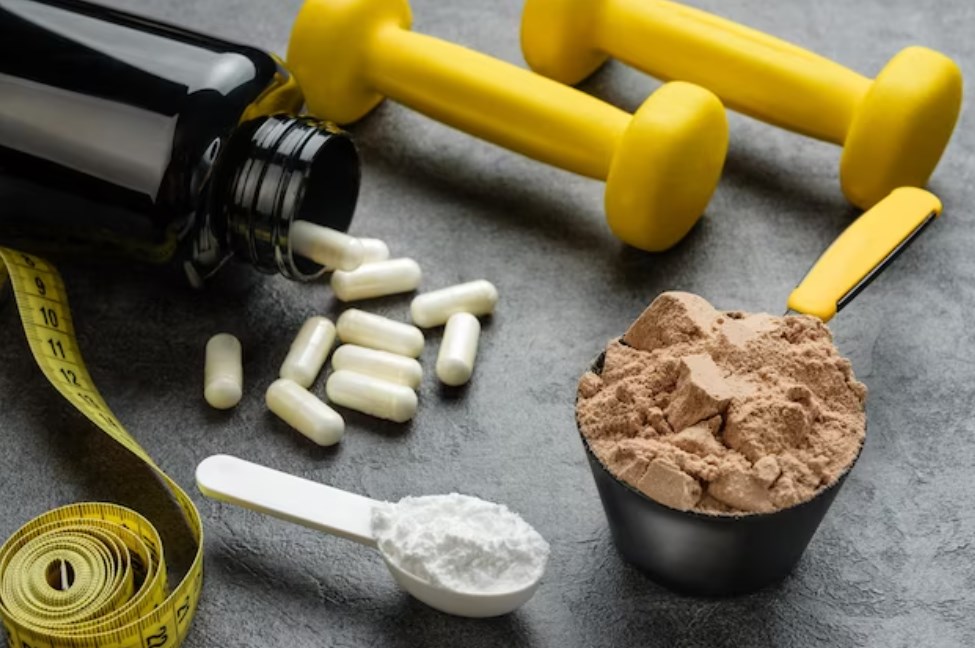The sports nutrition industry has seen a significant boom, shifting from an exclusive bodybuilders’ and athletes’ niche to a mainstream market. This comprehensive guide unravels the secrets behind the most effective sports nutrition products and their impact on athletic performance.
Rapid Growth of Sports Nutrition Industry
The sports nutrition sector is a thriving industry, driven by an array of products such as proteins, energy gels, and performance-enhancing supplements. Mintel research indicates that around one in four Britons (24%) have consumed a sports nutrition product in the past three months. This trend is even more pronounced among young men aged 16-24, with 42% using these products.
The spending on sports nutrition food and beverage products reached a whopping £66 million in the UK in 2015, a 27% surge from the £52 million recorded in 2013. These products are no longer occasional treats; for 47% of users, they have become dietary staples.
Creatine
Creatine monohydrate stands out as one of the leading performance-enhancing supplements available today. It enjoys a robust reputation as the most widely sold workout supplement ever, backed by a plethora of human studies proving its effectiveness and safety.
Creatine made headlines in the early 1990s when Linford Christie reportedly used it to train for his gold medal-winning performance in the 100m at the 1992 Barcelona Olympics. Today, creatine is a standard component for those involved in high-intensity, explosive sports such as football, rugby, boxing, and weightlifting.
Creatine, referred to as an “ergogenic” aid, is known to enhance physical performance. A daily intake of 3000mg of creatine has demonstrated potential to improve muscle strength, power output, speed, and lean muscle mass. Furthermore, creatine stimulates the production of proteins that lead to muscle fiber formation and increases muscle water content, contributing to a noticeable size increase.

Proteins
Whey Protein
Whey protein, essential for building and preserving muscle mass, is a crucial component in sports nutrition globally. Consuming protein, especially during the ‘anabolic window’ following exercise, can significantly aid muscle growth and repair.
Protein is universally beneficial, offering advantages to both genders, all age groups, different body types, and fitness levels. On average, an individual requires approximately 0.8g of protein per kg of body weight daily. However, endurance trainers might require roughly 1.2g/kg, while those involved in strength training may need approximately 2g/kg.
Vegan Proteins
Soy protein, closely resembling the amino acid profile of milk-based proteins, is the most prevalent plant protein. It is considered a complete protein, providing all essential amino acids and up to 90% protein content. Besides protein, soy-based products also offer a high fiber quantity and are rich in vitamins and minerals.
Alternatives to soy include plant-based protein powders like pea, rice, hemp, and quinoa, each with its unique flavor, texture, amino acid profile, and cost. While most plant-based proteins from a single source may be incomplete proteins, blending multiple plant sources can yield a ‘complete’ protein product.
Omega 3
Sales of Omega 3 globally were approximately 33 billion US dollars in 2016, with projections to increase to 57 billion US dollars by 2025 according to Grand View Research. Omega 3 fatty acids, known for their significant benefits to body and brain health, have gained popularity as a sports nutrition product.
Omega 3 is available in three forms: eicosapentaenoic acid (EPA), docosahexaenoic acid (DHA), and alpha-linolenic acid (ALA). EPA and DHA, the long-chain fatty acids, can be found in fish, fish oil supplements, and algae extract. ALA, the short-chain form, is present in plant sources like nuts, flax seed, chia seeds, avocado, and olive oil.
Omega 3 aids exercise recovery by leveraging its anti-inflammatory compounds to heal the microscopic tears that occur during strenuous training. Omega 3 also decreases heart rate and the body’s oxygen consumption rate, leading to better efficiency during sports activities.
BCAA/Leucine
Leucine, a member of the BCAAs crucial for muscle health, plays a pivotal role in stimulating muscle growth, modulating insulin sensitivity, and exerting a catabolic effect on fat. Leucine also enhances cognitive abilities that may deteriorate with intense physical activity. A deficiency in leucine will hinder protein utilization, regardless of protein intake.
Glucosamine
As a vital player in the creation of cartilage, glucosamine is often utilized as a dietary supplement both within and outside the realm of athletic performance. Primarily, it’s used to manage conditions such as arthritis and osteoarthritis. Glucosamine is naturally found in the fluid surrounding our joints and animal bones.
Glucosamine is essential for the synthesis of cartilage, a durable and malleable connective tissue found in various body regions. As we age, our cartilage loses its flexibility and gradually deteriorates. Certain researchers theorize that the ‘sulfate’ component of glucosamine sulfate is crucial as it aids the body in cartilage production. This idea forms the basis of the belief that glucosamine sulfate may be more beneficial than other types such as glucosamine hydrochloride or N-acetyl glucosamine.
Multivitamins
The optimal functioning of our bodies necessitates an adequate intake of vitamins and minerals. Regrettably, given our hectic modern lifestyles, achieving this through a balanced diet isn’t always feasible. Many individuals turn to multivitamins to supply their bodies with the required nutrients. These supplements contain a mix of vitamins that are typically found in food and are utilized to bridge nutritional gaps, ensuring that one meets their daily vitamin intake.
When deprived of its daily vitamin needs, the body works harder to perform everyday tasks, potentially leading to exhaustion and health complications. In relation to athletic nutrition, damaging free radicals often cause muscle aging and associated issues. Regular intake of multivitamins can help keep these free radicals in check, boost the immune system, and decrease the likelihood of an athlete falling sick prior to a competition or training session.
Green Tea
Originating in China and widespread across Asian cultures, green tea, made solely from the Camellia sinensis plant leaves, is valued for its health benefits. The manufacturing process of green tea, the least processed of all teas, helps retain a greater portion of its nutritional properties compared to other varieties.
Green tea extract, abundant in polyphenols and catechins, has been found beneficial in managing obesity by inducing thermogenesis and promoting fat oxidation. The catechin called epigallocatechin gallate (EGCG), abundant in green tea, is believed to boost resting metabolism and stimulate fat burning.
Caffeine
Caffeine is one of the most extensively researched and beneficial performance-enhancing substances available. Typically consumed in coffee, each cup contains approximately 75mg of caffeine. Its recognized performance-enhancing effect has led to its wide use.
Caffeine primarily acts on the brain to reduce the perception of effort, particularly noticeable in endurance events such as running or cycling. In longer competitions, mental fatigue significantly affects performance. Caffeine can help maintain physical performance in these instances. For an athlete weighing 150-pounds (68 kg), the recommended caffeine dosage is about 200 mg, taken an hour before exercise.
Glutamine
Glutamine plays a crucial role in detoxifying the body from high ammonia levels. It serves as a buffer and converts excess ammonia into other amino acids, amino sugars, and urea.
Performing around an hour of exercise can cause a 40% reduction in the body’s glutamine levels. This decrease can lead to suppressed immune function, potentially negatively impacting resistance training and possibly leading to overtraining syndrome.
L-glutamine benefits endurance athletes by enhancing their immune systems. By supplementing with L-glutamine, your muscles can withstand more intensive training, which boosts strength and aids skeletal muscle repair.
Nitric Oxide
Produced by nearly every type of cell in the human body, nitric oxide is an essential molecule for maintaining healthy blood vessels. Supplements designed to increase nitric oxide production are gradually gaining popularity within the realm of athletic nutrition.
Not only do nitric oxide supplements enhance nitric oxide production, but they also help reduce muscle soreness, lower blood pressure, and boost exercise performance. Nitric oxide plays a role in numerous cellular processes, including the dilation of blood vessels, which aids in delivering nutrients and oxygen to muscles during exercise, thereby enhancing athletic performance.
Key Takeaways
| Supplement | Main Benefit |
|---|---|
| Glucosamine | Vital for building and maintaining cartilage, beneficial for arthritis sufferers |
| Multivitamins | Helps to meet daily vitamin and mineral needs, supports immune system |
| Green Tea | Rich in polyphenols and catechins, aids in obesity management and fat oxidation |
| Caffeine | Enhances performance by reducing perception of effort |
| Glutamine | Supports detoxification, helps in muscle recovery and immune function |
| Nitric Oxide | Enhances blood vessel health and exercise performance, reduces muscle soreness |
Final Thoughts
In the realm of athletic performance, understanding how each supplement works, its benefits, and potential effects is critical. With advancements in science and nutrition, a wide array of supplements is now available that cater to different needs, from building muscle to detoxifying the body.
However, it’s crucial to remember that supplements should complement a balanced diet and consistent training routine, not replace them. Before starting any supplement regimen, consult with a healthcare provider or a sports nutrition expert to ensure you’re making the best choices for your unique needs and goals.
